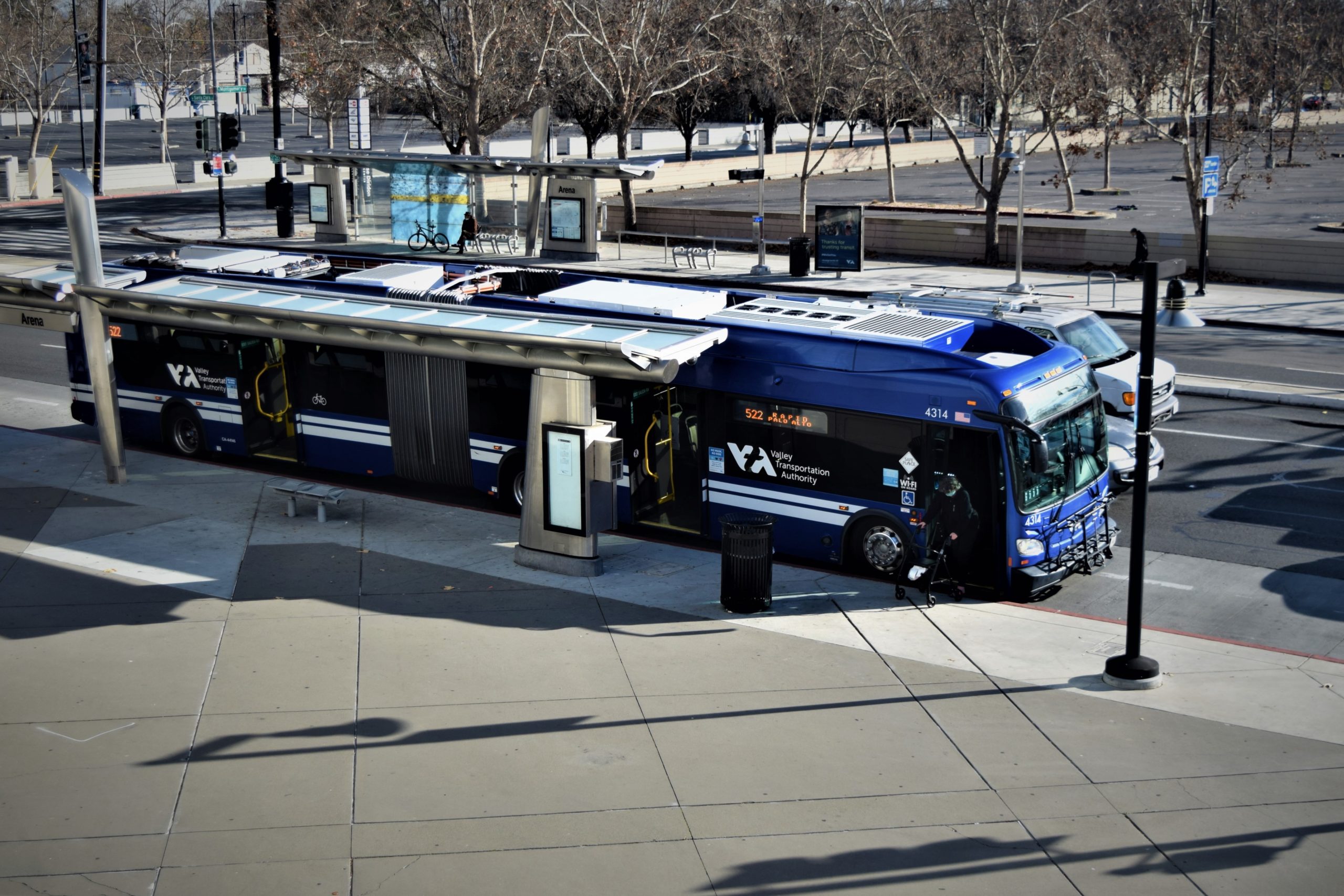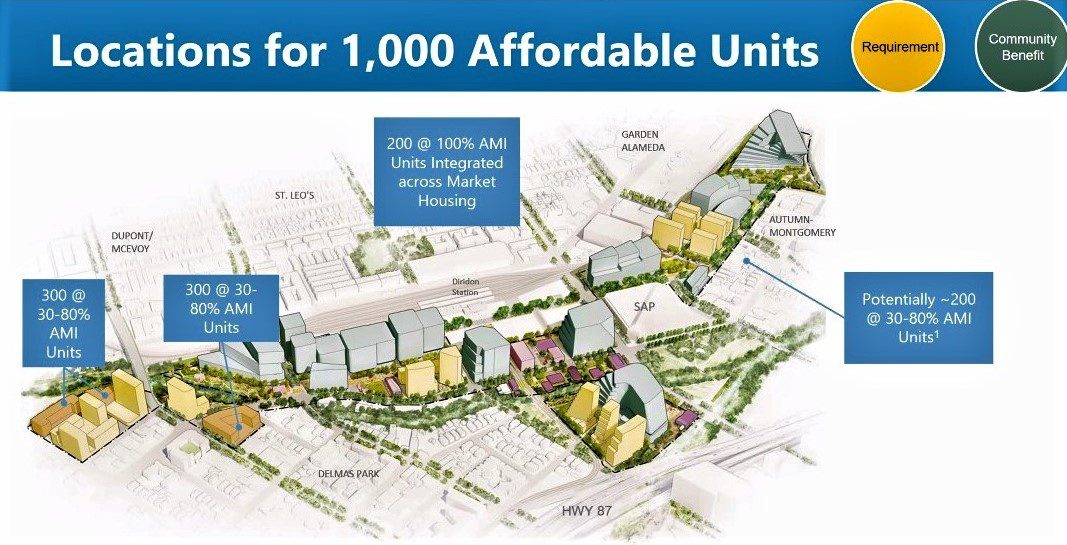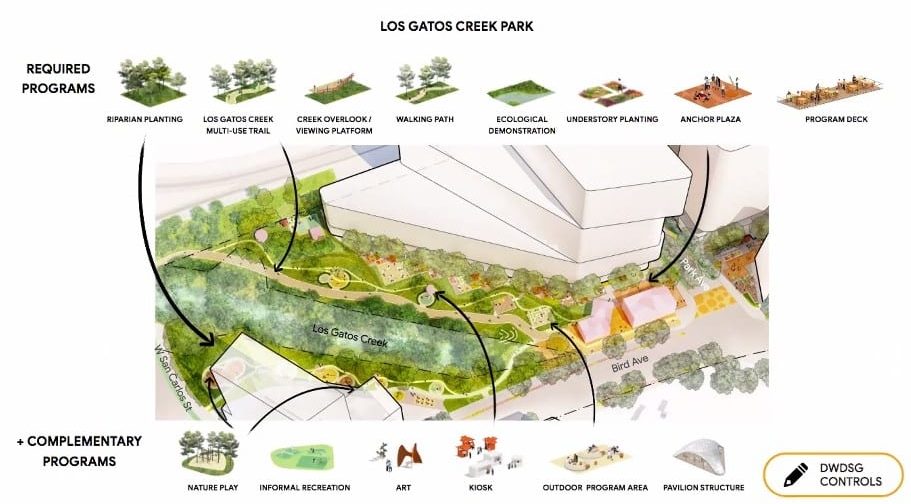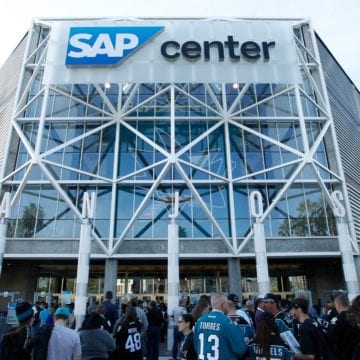The San Jose Sharks are taking a bite out of Google’s plan to build a massive downtown campus.
The NHL team voiced deep concern with the city’s development agreement with Google for its proposed campus, saying efforts to preserve parking near SAP Center are inadequate.
“The city and Google are heading down a path that would be devastating for the arena,” said Jon Gustafson, vice president and general manager of Sharks Sports and Entertainment. “This development cannot be allowed to proceed at the cost of the arena’s future or the Sharks franchise in San Jose.”
Gustafson spoke Wednesday during the Diridon Station Area Advisory Group (SAAG) meeting. His comments followed city presentations on the agreement, including details on the $154.8 million community fund.
Harvey Darnell, a SAAG member and resident of North Willow Glen, supported the agreement and said the city and Google should work with the Sharks to find an arrangement that benefits everyone.
“I’ve been working with the Sharks organization for way over a decade,” Darnell said. “We really want to support them in making sure the traffic management plan allows them to do what they need to do.”
The Sharks first raised concerns last year, warning the team could be forced out of San Jose because the proposed Google project and other developments in the Diridon Station area would block fans’ access to SAP Center.
The development agreement‘s parking plan requires Google to maintain 2,850 “publicly available commercial parking spaces” at the project site during all phases of construction. The company would be allowed to build up to 4,800 public parking spaces, with roughly 85%—or 4,080—available for SAP Center event attendees.

An alternative parking arrangement described in the agreement says the city may require Google to build additional parking spaces within a third of a mile from SAP Center to meet the 2,850-space minimum.
Gustafson felt confident the city and Google could find an arrangement that works for all parties, but said the agreement as it stands today falls short for the Sharks and their fans.
“We still believe the Downtown West project can coexist with a successful thriving arena… unfortunately, almost none of our requests for changes were incorporated,” Gustafson said. “(Sharks Sports and Entertainment) cannot support the agreement as proposed.”
Overall, city officials and SAAG members applauded the agreement, which promises $200 million in community benefits, in addition to hundreds of millions of dollars in development fees and land for 800 affordable housing units. Economic Development Director Nanci Klein said when taking Google’s voluntary commitments into account—such as its promised 4,000 housing units and a 30% local hiring goal for construction—the benefits of the project total roughly $1.25 billion.
“This project raises all boats,” Klein said. “It raises the bar.”

The city also shared details on the $154.8 million community fund, which would be governed by a 13-member committee of people with “a meaningful connection to San Jose.” Five committee members would experience living or owning a business in an area at high risk of displacement, such as East San Jose. The remaining eight would have “technical expertise” in fields working against displacement, such as nonprofit management, affordable housing and homeless support services.
Klein said the committee would reflect the racial, ethnic, economic and generational diversity of San Jose. In addition to the 13 voting members, three city representatives and one Google representative would hold advisory roles. Committee members and city staff would also hire a third-party manager to help select recipients for community fund grants.
At Wednesday’s meeting, SAAG members praised the agreement, with several saying the development standards applied to Google should be required of all builders in the Diridon area.
Kathy Sutherland, a SAAG member and resident of the Delmas Park neighborhood, said she was “delighted and anxious” by Google’s proposed campus and the accompanying agreement.
“I would like the city to require the same thoughtfulness and standards for all developers within the DSAP area,” Sutherland said, referring to the wider Diridon Station Area Plan under review. “I don’t want a scenario where on one side of the street you see that it’s Google, and on the other side of the street not so much, because the amenities aren’t there.”
Kevin Christman, SAAG member and resident of the Gardner neighborhood, said the city must be accountable for the administration of funds offered by the tech giant.
“I would like to make sure or have some assurances that these funds don’t get lost in the paperwork,” Christman said. “Make sure what’s meant for housing stays with housing, what’s meant for parks stays with parks.”

Michele Imokawa, who works in the service industry, said she appreciated Google’s commitment to pay its workers fairly.
“I appreciate that Google has committed themselves to quality service jobs,” Imokawa said. “As a service worker, this means I can have a stable life here in San Jose.”
Resident Corey Smith said the development agreement is a “once-in-a-lifetime proposal,” and said it may not be financially feasible to require the same standards from other developers.
“From a community perspective, from a conversation perspective, I think that makes sense,” Smith said. “From a financial perspective, it is difficult for any private development to match what’s in front of you.”
Paul Soto, who grew up in the Horseshoe area, said much of the Chicano community is left out of conversations around the proposed Google project.
“SOMOS (Mayfair) does not speak for the Chicano community, Working Partnerships does not speak on behalf of the Chicano community, nor does Silicon Valley Rising speak on behalf of the Chicano community,” Soto said.
The San Jose Planning Commission has its final hearing on the Google project and the Diridon Station Area Plan on April 28. However, the city has not scheduled the hearing on their meeting portal as of Thursday morning. The San Jose City Council will vote on the project on May 25, along with the Diridon Station Area Plan and the Affordable Housing Implementation Plan.
The next community meeting on the Google development agreement is on Saturday at 10 a.m. Readers can find more information about the meeting here.





